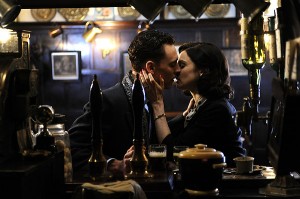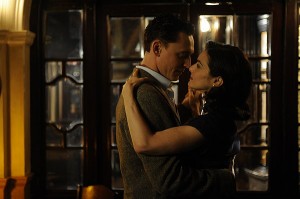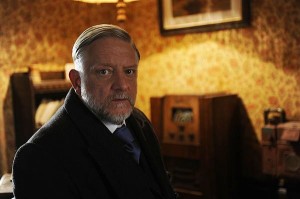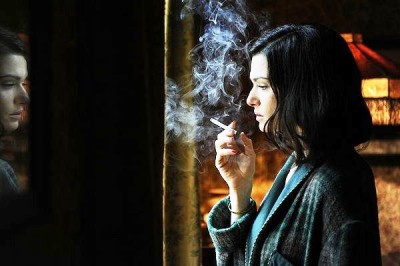
I hadn’t cared for Terence Davies’ The House of Mirth (2000)—the only thing of his I’d seen—and so I wasn’t exactly quivering in anticipation over his film of Terence Rattigan’s 1952 play The Deep Blue Sea. I envisioned a dreary, airless slog through canned theatre. By way of a pleasant surprise, the first thing I encountered instead was an almost 10-minute stretch of sinuous visuals set to Samuel Barber’s “Concerto for Violin and Orchestra,” detailing not only Hester Collyer’s (the splendid Rachel Weisz in one of her most intense performances) suicide attempt, but an almost hypnotic encapsulation of the events leading up to this attempt. There are evocations of David Lean’s Brief Encounter (1945)—almost a refutation of its ending—and one of the most intense sex scenes I’ve encountered in about 30 years. Anything more removed from my memories of The House of Mirth could scarcely be imagined.

The rest of The Deep Blue Sea may not always live up to this opening, but it comes darn close most of the time. The film continues its established form of intelligently opening up Rattigan’s play, but in no way does Davies undermine it. If anything, by firmly placing the story among images of drab, bombed-out, post-war London (the film is set “around 1950”)—particularly the images on which the film opens and closes—Davies visually enhances the content of the play in a purely cinematic way. It makes the story’s aura of post-war malaise and dissatisfaction seem even more concrete.

The idea of the film is simple enough. Hester is married to a thoroughly nice older man, a judge, Sir William Collyer (Simon Russell Beale, My Week with Marilyn), who, unfortunately, has a thoroughly unpleasant mother (Barbara Jefford, The Ninth Gate)—a woman who is no help at all in keeping the marriage intact. The old girl, in fact, goes out of her way to find fault with anything Hester does. Poor Hester can’t even pour tea “properly” (“Oh, well, I’m sure it will still be refreshing”) and is constantly saying the wrong thing. When Hester remarks that she does occasionally play sports, but finds it hard to be passionate about them, her mother-in-law warns her, “Beware of passion, Hester, it always leads to something ugly.” As a replacement, the old lady suggests “guarded enthusiasm,” noting that “it’s safer.” The problem is that Hester doesn’t want safer. She wants something to feel passionate about—and that something is former RAF pilot Freddie Page (Tom Hiddleston, Midnight in Paris).

Hester soon leaves her husband for Freddie, but things don’t work out—leading to the suicide bid at the film’s opening. The overall thrust of the film lies in the flashbacks that brought her to the attempt, and what happens in its aftermath. The sense of the pain of repression—and the pitfalls of ignoring that repression—is palpable, and is no doubt informed by the closeted (or at least discreet) homosexuality of Rattigan, as well as the apparently unhappy homosexuality (if we’re to believe his own comments) of Davies. Yet that topic itself never comes up—as it never did directly in any of Rattigan’s works. It does, however, impact the tone of the work.
This is not a fast-paced film, though I’d never call it slow, and I tend to think it will have more resonance for older viewers. That’s not because of the pace, but simply because older viewers are more apt, on the whole, to know both sides of the equation in the film—feelings both repressed and acted upon—and the consequences of each. At the same time, I recommend it to anyone interested in seeing an intelligent, creative, beautifully crafted film. Rated R for a scene of sexuality and nudity.




I just watched this on a quiet Friday evening. It is both rich and almost painful to witness. The writing is nuanced and brilliantly takes us into the painful world of neediness and as you say repression. Rachel Weisz is just breathtaking in this.
Finding this quite by accident tonight reminded me that plays with the right direction can work sometimes better as a film. I am wondering if you are familiar with SEPARATE TABLES? It was very much a staple of most theater programs when I was in college back in the Ice Age.
That’s also Rattigan, isn’t it? I’ve never read the play, but I’ve seen the 1958 film version — years ago, unless bumping into it (but not really watching it closely) on TCM counts (and it really doesn’t).
Yes . He also wrote THE WINSLOW BOY and THE BROWNING VERSION all of which were adapted for the screen by him. He is underappreciated here because he dealt with ( as you have eloquently stated) the notion of repressed passion. Americans don’t repress much.
His dialogue is brilliant. He has also been compared to TENNESSEE WILLIAMS for obvious reasons. But some might not see it. I see it in the complex, damaged characters that are often mouthpieces for his own lost love.
‘When you’re between any kind of devil and the deep blue sea, the deep blue sea sometimes looks very inviting.” Terrence Rattigan